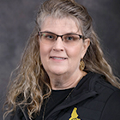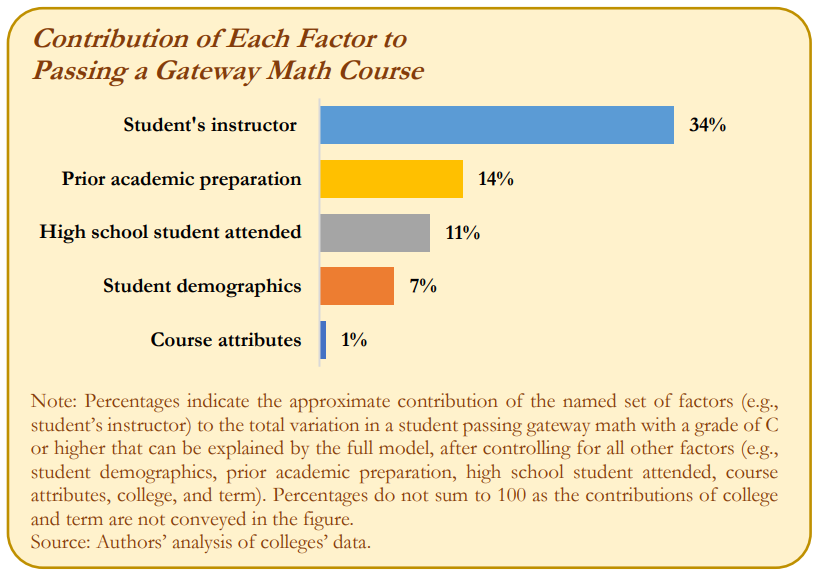October, 2023 Eye on Research
Commentary
In last month’s blog, I shared how AACRAO is exploring redefining some terms in common usage in higher education, including alternative credentials and new-gen credentials, as part of the forthcoming handbook Academic Operations: The Role of the Registrar. Eventually these and other credentials may be known as a “type” of credential. In a chapter of the handbook about ways to manage credentials, we have decided to use the term credentials to encompass all traditional and recently asserted credentials. The point is no matter the type of credential, they must all be managed in the same way to ensure the quality, validity and immutability of each.
In the process of developing the handbook, it has also become apparent that CLRs and LERs are the same thing for some institutions, and separate items at other institutions. We are now exploring how to discuss these higher-education terms and looking at ways to include this information in the handbook.
I welcome any feedback on these topics. You, our membership, and other subject-matter experts help shape our work. Please email me at wendyk@aacrao.org with any questions or thoughts on the definition of the terms CLR and LER.
AACRAO Research Update
AACRAO Research Grant Winners

We are pleased to announce we were able to award research grants to each of three recipients. Watch for more about our recipients’ research in AACRAO Connect between now and December 12th. Below is a brief peek at this year’s recipients.
 Polly Hulsey
Polly Hulsey
College of Southern Idaho, Dean of Student Access and Outreach
Topic Influence of a sense of belonging among dual enrollment high school students and their decision to pursue higher education
 Aimee Leturmy
Aimee Leturmy
Bentley University, University Registrar
Topic Return on investment: Exploring the experiences of first-generation students at a private, business-focused university

Jennifer Love
Assistant Vice Provost of Texas One Stop, University of Texas at Austin
Topic How students make sense of institutional debt policies and holds
AACRAO Graduate Research-Grant Application Opening Soon for 2024-2025
The grant application for the 2024-2025 award year will open on December 5, 2023. We look forward to receiving your applications.
Thank You Dr. Mike Flanigan!

Dr. Mike Flanigan, Associate Vice President for Strategic Initiatives and Project Management at Virginia Commonwealth University, finished his tenure as a member of AACRAO’s research advisory board on September 30, 2023. Mike served as a valuable member of the advisory board for over 5 years and will be missed. Thank you Mike!
AACRAO Research Advisory Board Seeking Additional Members
We now have a vacancy on the research advisory board. The application page for a new board member is currently open. We will review all applications by the end of November and select a new member by the end of December, 2023.
AACRAO Completes the Partnership with WICHE on Administrative Holds
Last year AACRAO partnered with WICHE on a project to help a group of institutions assess their use of administrative holds. The summary of that project and the resources created from it are available here.
Operational Efficiency of Academic Operations
The report for the October 60-Second survey will be released on November 15th. This research is made possible in part by underwriting from Ad Astra - Graduate more students faster.
AACRAO is actively engaged in defining and benchmarking the term academic operations. The purpose of operational efficiency in higher education is to achieve objectives with the fewest resources possible. The goal is to use resources efficiently to improve results. Proficient, efficient academic operations contribute to the success, persistence and education completion of a learner.
Chief Enrollment-Management Career Profile Survey
We are actively seeking participants to complete the chief enrollment-management career-profile survey in an attempt to reach a representative sample of U.S. higher-education institutions. Part of that outreach will take place during the AACRAO SEM conference in November. The final report will be available in December, 2023, or January, 2024.
Current Higher-Education Research and Related Topics
Study Shows Impact of Faculty and Teaching Methods on Gateway Math Success
According to a new study from Education Equity Solutions, instructors and the teaching strategies they employ—or don't employ—have a greater impact on learning outcomes than a student’s prior academic achievements. Figure 1. The study examined the academic performance of 22,827 students in 704 gateway math classes at four California community colleges. Key takeaways include:
Figure 1: Contribution of Each Factor to Passing a Gateway Math Course

Source: Counting on Math Faculty | Education Equity Solutions. (n.d.). EdEquitySolutions. https://www.edequitysolutions.com/counting-on-math-faculty
Study Examines the Challenges and Opportunities of the Gen-Z Population
Gallup and the Walton Family Foundation partnered to study Gen Z's perspectives and have released a research report. The report details a nationally representative, multiyear study of thousands of Gen-Z members, aged 12 to 26. The intent of the research is to aid policymakers and researchers in understanding Gen-Z members’ needs to make data-driven decisions. Key findings about Gen-Z members include the following.
-
47% say they are happy with their life, which is a much lower figure than millennials at the same age and is among the lowest of all generations in the United States today.
-
Although 76% believe they have a bright future, only 44% say they feel ready for it.
-
They are more than twice as likely to believe they have a bright future and will achieve their goals if an adult pushes them to pursue their goals and dreams.
-
Students with “outstanding mental health” are 24 points less likely to have skipped any class in the previous month (41% versus 65%).
-
Students with outstanding mental health are more than twice as likely to claim they earn excellent grades in school (53% against 25%).
-
Gen Zers most frequently express the desire to "make enough money to live comfortably" in the future (69%), while 64% believe lack of financial resources will prevent them from fulfilling their objectives and aspirations in the future.
50-State Comparison of Secondary-Career and Technical-Education Policies
This 50-State Comparison provides an overview of secondary-career and technical-education (CTE) policies and activities across the United States. It focuses on state-level policies and plans impacting CTE, including agencies, funding, program approval, teacher certification, diplomas, dual enrollment and federal measures. The comparison shows that in at least 38 states, the CTE director is housed within the K-12 education system. Student-based funding is the most common approach. Over 20 states offer a CTE diploma or endorsement, and 43 states allow students to take CTE courses through state dual and concurrent enrollment.
Many High-School Graduates Are Opting Out of Attending 4-Year Institutions
The 2023 Post-Graduation Readiness Report, published by YouScience, reveals a noteworthy trend among surveyed high-school graduates. In 2023, 55% of them chose not to attend a regular 4-year college. This change highlights the need for individualized assistance in today’s educational and workplace environments. Based on a nationwide poll of more than 500 students, the report emphasizes how crucial it is to improve education and involvement for the next generation of workers. Key findings include:
-
27% said they were enrolled in a 2-year college
-
13% said they were working toward a career goal
-
7% were enrolled in trade or technical school
-
5% indicated they were enlisting in the military
-
8% said they were taking time off or taking a “gap year”
-
9% stated they had no plan after high school
-
65% reported having five or fewer discussions about options after high school with teachers or counselors
-
31% stated they are unsure of their future path in terms of education or career
Study Examines the Persistence Struggles of Hispanic Students
According to a Lumina Foundation-Gallup survey, Hispanic students struggle more to remain in college than students of any other race or ethnicity. Compared to 40% of Black and 37% of White students, 50% of Hispanic students in posthigh-school programs found it difficult or very difficult to stay in school. Figure 2. College attendance was significantly impacted by the epidemic, falling by almost 7% between 2019 and 2021. Additionally, over half of Hispanic students considered leaving college during a 6-month period, with factors such as emotional stress, mental health, cost and difficult coursework being the main reasons.
Figure 2: Difficulty in Remaining Enrolled by Ethnicity

Report Examines the Motivations and Outcomes of Community-College Students
A new report from Strada investigates the needs and desires of community-college students and ways institutions can help students achieve their goals. Some key findings from the report include the following.
-
Community-college students have a variety of motivations for enrolling. Figure 3. A career is reported as the most common motivation, but less than 50% of recent students reported achieving their desired career outcome.
-
Other personal and community-related motivations are less noted but more likely to be fulfilled.
-
Only about 33% of community-college attendees in the study had completed an associate degree; however, a majority report achieving their goals.
-
70% of students reported developing skills related to post-completion earnings were extremely or very important.
Figure 3: Recent Students’ Motivations for Enrolling

Report Examines Policies that Affect Adult Learners
A special report from Inside Higher Ed examines state and federal regulations that restrict adult education. The report also examines ways to develop higher-education pathways that are easier to access, less expensive and more successful. With increasingly complicated lives and more dependents, the profile of college students in the United States has changed dramatically. Demographic and socioeconomic shifts have changed faster than policy advancements. The Higher Education Act fails to address the needs and demands of many adult learners.
Study Examines How Role Models Affect Future Success
A report from Gallup and Amazon shows young adults who had successful role models during their youth are more satisfied with their careers and financial standing. Key recommendations from the report include the following.
-
The best role models are trustworthy, have knowledge and expertise, are examples of success and are motivating.
-
Role models who share common life experiences help foster connection and a sense of belonging.
-
It’s important for role models to share job insights, such as education and skills, for success and daily job expectations.
Public Views on Free Speech in Higher Education Examined
A new report on the freedom of speech on campus has been released by AP and the NORC center at the University of Chicago. The study found most adults oppose state or other government restrictions on speech at state-funded colleges and universities. Figure 4. However, public attitudes toward freedom of expression vary widely, including issues such as banning offensive speech, religious or political promotion, and marginalized group views.
Figure 4: Perceptions of Freedom of Speech on Campus

Legislative Movement Against Unpaid Internships
An article in Inside Higher Ed discusses how The National Association of Colleges and Employers is advocating to outlaw unpaid internships. They argue modern legislation is needed to address an inconsistency in employment status. Key points include the following.
-
Students who complete a paid internship receive, on average, 1.61 job offers after graduating.
-
Students who complete an unpaid internship receive, on average, 0.94 job offers after graduating.
-
Paid interns report making a median starting salary of $20,000 more than unpaid interns.
“Faces of Faculty” Report Looks at Faculty Job Satisfaction, Challenges and Support
The “Faces of Faculty 2023” report highlights the satisfaction and stability of educators, despite COVID and new stressors, such as AI. Faculty members require institutional support to maintain work/life balance and avoid burnout. Key findings include the following.
-
Compared to the previous year, more faculty members are happy with their jobs. Figure 5.
-
Faculty still spend the majority of their workdays teaching.
-
Faculty members report feeling more secure in their positions.
-
While many pandemic-related difficulties have vanished, others, such as plagiarism, have worsened.
-
There are gaps between what faculty need and what they receive, even though they receive strong institutional support in some areas.
-
Many faculty members struggle to understand the new technological paradigm as they try to reconcile the intersection of artificial intelligence and academic integrity.
Figure 5: Satisfying Components of Faculty Roles
